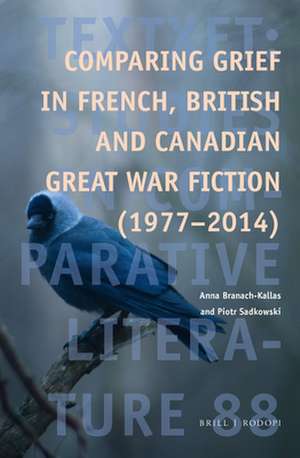Comparing Grief in French, British and Canadian Great War Fiction (1977-2014): Textxet: Studies in Comparative Literature, cartea 88
Autor Anna Branach-Kallas, Piotr Sadkowskien Limba Engleză Hardback – 18 iul 2018
Din seria Textxet: Studies in Comparative Literature
- 18%
 Preț: 777.80 lei
Preț: 777.80 lei -
 Preț: 307.31 lei
Preț: 307.31 lei -
 Preț: 367.22 lei
Preț: 367.22 lei - 15%
 Preț: 525.14 lei
Preț: 525.14 lei - 15%
 Preț: 525.14 lei
Preț: 525.14 lei - 15%
 Preț: 521.19 lei
Preț: 521.19 lei - 15%
 Preț: 402.14 lei
Preț: 402.14 lei - 18%
 Preț: 558.12 lei
Preț: 558.12 lei - 15%
 Preț: 401.53 lei
Preț: 401.53 lei -
 Preț: 215.07 lei
Preț: 215.07 lei - 15%
 Preț: 403.26 lei
Preț: 403.26 lei -
 Preț: 307.46 lei
Preț: 307.46 lei - 15%
 Preț: 386.84 lei
Preț: 386.84 lei - 27%
 Preț: 708.91 lei
Preț: 708.91 lei -
 Preț: 374.82 lei
Preț: 374.82 lei - 15%
 Preț: 370.46 lei
Preț: 370.46 lei - 15%
 Preț: 386.66 lei
Preț: 386.66 lei - 18%
 Preț: 904.52 lei
Preț: 904.52 lei - 18%
 Preț: 547.76 lei
Preț: 547.76 lei -
 Preț: 225.91 lei
Preț: 225.91 lei - 15%
 Preț: 475.49 lei
Preț: 475.49 lei - 15%
 Preț: 490.59 lei
Preț: 490.59 lei - 15%
 Preț: 396.48 lei
Preț: 396.48 lei - 18%
 Preț: 546.78 lei
Preț: 546.78 lei - 18%
 Preț: 605.09 lei
Preț: 605.09 lei - 18%
 Preț: 550.96 lei
Preț: 550.96 lei - 18%
 Preț: 605.33 lei
Preț: 605.33 lei - 18%
 Preț: 552.04 lei
Preț: 552.04 lei - 18%
 Preț: 631.23 lei
Preț: 631.23 lei - 18%
 Preț: 546.00 lei
Preț: 546.00 lei - 18%
 Preț: 525.45 lei
Preț: 525.45 lei - 18%
 Preț: 1045.46 lei
Preț: 1045.46 lei - 18%
 Preț: 551.08 lei
Preț: 551.08 lei - 18%
 Preț: 610.42 lei
Preț: 610.42 lei - 18%
 Preț: 590.65 lei
Preț: 590.65 lei - 18%
 Preț: 530.79 lei
Preț: 530.79 lei - 18%
 Preț: 704.35 lei
Preț: 704.35 lei - 18%
 Preț: 600.78 lei
Preț: 600.78 lei -
 Preț: 306.93 lei
Preț: 306.93 lei
Preț: 586.66 lei
Preț vechi: 715.43 lei
-18% Nou
Puncte Express: 880
Preț estimativ în valută:
112.27€ • 115.83$ • 95.02£
112.27€ • 115.83$ • 95.02£
Carte indisponibilă temporar
Doresc să fiu notificat când acest titlu va fi disponibil:
Se trimite...
Preluare comenzi: 021 569.72.76
Specificații
ISBN-13: 9789004364776
ISBN-10: 9004364773
Dimensiuni: 155 x 235 mm
Greutate: 0.52 kg
Editura: Brill
Colecția Brill
Seria Textxet: Studies in Comparative Literature
ISBN-10: 9004364773
Dimensiuni: 155 x 235 mm
Greutate: 0.52 kg
Editura: Brill
Colecția Brill
Seria Textxet: Studies in Comparative Literature
Notă biografică
Anna Branach-Kallas, Ph.D., D. Litt., is Associate Professor at Nicolaus Copernicus University in Toruń, Poland. She has published monographs and over seventy articles on corporeality, diaspora, trauma and war, as well as postcolonial and comparative literature in English and French.
Piotr Sadkowski, Ph.D., D. Litt., is Associate Professor at Nicolaus Copernicus University in Toruń, Poland. He has published a monograph and many articles on such topics as war, myth, migration, intertextuality and post-memory in francophone literatures.
Piotr Sadkowski, Ph.D., D. Litt., is Associate Professor at Nicolaus Copernicus University in Toruń, Poland. He has published a monograph and many articles on such topics as war, myth, migration, intertextuality and post-memory in francophone literatures.
Cuprins
AcknowledgementsIntroduction1 FacesBetween Stigmatisation and Sacralisation: The Officers’ Ward by Marc Dugain From Destruction to Reconstruction: My Dear, I Wanted to Tell You by Louisa Young Facial Disfigurement and Shell Shock: Tell by Frances Itani Abjection and Precarity: The Great Swindle by Pierre Lemaitre Aversion and Masks: Toby’s Room by Pat Barker2 WomenMaternal Pacifism: Dans la guerre by Alice Ferney Grief and Betrayal: Zennor in Darkness by Helen Dunmore Gendered Disorder: My Dear, I Wanted to Tell You by Louisa Young Asymmetric Similarities: Deafening by Frances Itani Empathetic Unsettlement: Les Fleurs d’hiver by Angélique Villeneuve3 CommunitiesEgoism and Brutalisation: By a Slow River by Philippe Claudel Adoptive Kinship: The Heroes’ Welcome by Louisa Young Community of Memory: Broken Ground by Jack Hodgins Canada Divided: The Draft Dodger by Louis Caron and A Secret Between Us by Daniel Poliquin Community of (Not)Seeing: In Desolate Heaven by Robert Edric4 MournersPsychic Crypt: The Stone Carvers by Jane Urquhart The Illness of Mourning: Toby’s Room by Pat Barker The Cult of Mourning: The Great Swindle by Pierre Lemaitre Infinite Grief: Le Monument. Roman vrai by Claude Duneton5 Post-MemoryAn Intimate “Archaeology of Knowledge”: The Wars by Timothy Findley Writing as the Act of Sepulchre: The Acacia by Claude Simon A Family’s Compiègne Wagon: Fields of Glory by Jean Rouaud Female Seekers: In Pale Battalions by Robert Goddard and Birdsong by Sebastian Faulks Homoerotic Post- Memory: Douze lettres d’amour au soldat inconnu by Olivier BarbarantConclusionBibliographyIndex
Recenzii
"Significantly, in contrast to the prevailing analytical framework, Branach-Kallas and Sadkowski do not focus on literary representations of combat and front life, but on texts that depict the long-lasting aftermath of the war in order to investigate the psychological and social effects of the conflict and to inquire into why the war refuses to be buried in the past. Comparing Grief explores the “changed reality” after the Great War and analyses the cultural trauma produced by the war in France, Canada, and Britain, focusing on shell-shock and the ensuing disintegration of individual identity and communal bonds. "
- , Katarzyna Więckowska, in Anglica: An International Journal of English Studies, Vol. 27.3 (2018), pp. 249-255
- , Katarzyna Więckowska, in Anglica: An International Journal of English Studies, Vol. 27.3 (2018), pp. 249-255
